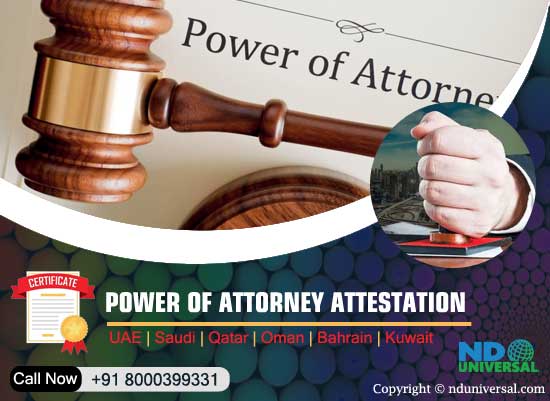🔍Power of Attorney Attestation
All you should know about Power of Attorney attestation 📜
Before discussing attestation, it's important to understand the nature and many varieties of power of attorney (POA). A POA is a legal document that permits one person (the principal) to designate another (the agent or attorney-in-fact) to act on his or her behalf. This can include a variety of decisions, such as financial transactions, healthcare options, or legal problems.
Power of Attorney attestation is a critical step for Indian passport holders who seek to do legal business overseas. It is a process in which local authorities verify the authenticity of the Power of Attorney paperwork. It ensures its acceptance by a foreign authority. Let’s talk about the whole process of power of attorney attestation in India.
❔ Need clarity on drafting a POA? Ask us about templates or legal guidelines! ✍

📌 Reasons To Obtain Power of Attorney Attestation
- ⚖ Legal ValidityAttesting a POA grants legal validity to delegated powers.
- 🛡 Prevent Fraud: Protects against misuse of authority.
- 🌍 International Recognition: Essential for cross-border transactions.
- 📋 Administrative Approval:Required by institutions for processing requests.
- 🏠 Property Transactions: Critical for real estate dealings.
- 👨⚖ Court Proceedings: Adds credibility in legal disputes.
❔ Unsure which reason applies to your case? Let’s discuss your needs! 💬
What Are the Steps to Attest Power of Attorney?
- Local Verification: A notary public drafts and validates the document. Then they create a POA that is in accordance with Indian legislation.
- Notary Attestation: The document is delivered to Notary Public Offices or Collectors' offices after local verification. Officials inspect and study the document, stamping it with a Notary Stamp if everything is correct.
- State/SDM Attestation: Choose between slower State (30+ days) or faster SDM (3-4 days) options.
- MEA Attestation: The Ministry of External Affairs (MEA) of India, a central government agency, validates the document's legitimacy. Following satisfactory verification, the MEA stamps or signs the back of the Power of Attorney paperwork.
However, if you intend to use your Power of Attorney document in a country that is not a signatory to the Hague Convention, simply obtaining an attestation from the Ministry of External Affairs (MEA) will not suffice. In such cases, a further procedural step known as Embassy Attestation becomes necessary.
❔ Confused about SDM vs. State attestation? We’ll guide you! 🗺
💸 Power of Attorney Attestation Fees and Pricing
The rates and prices for a Power of Attorney attestation can vary depending on several criteria, including jurisdiction, attestation procedure complexity, and service provider involvement. Ensure the credibility of your documents following this easy-to-read guideline. To ensure a smooth and accurate attestation process at the most competitive price, you can consult ND Universal.
❔ Want a fee estimate or step-by-step assistance? Reach out now! 📩
🌟 Why Choose ND Universal?
We simplify attestation with expertise, speed, and transparency. Let’s make your POA globally valid!
🌍 Countries Covered for Power of Attorney Attestation
Power of Attorney attestation is widely required across Gulf countries and for Hague Convention (Apostille) nations. ND Universal provides complete assistance for attestation services for:
- UAE Required for property sales, job authorization, or setting up a business.
- Oman Essential for family visa approvals, real estate dealings, and business contracts.
- Qatar Commonly used for court cases, property management, and business purposes.
- Kuwait Mandatory for work permits, business dealings, and property transfers.
- Saudi Arabia Compulsory for employment visas, legal approvals, and commercial transactions.
- Bahrain Necessary for family visas, property issues, and power delegation.
- Apostille Countries If your destination is a Hague Convention country, Apostille attestation is enough instead of embassy attestation.
👉 Get in touch with us for country-specific POA attestation services
Frequently Asked Questions
-
How to attest Power of Attorney for UAE?
The process involves Notary attestation, MEA attestation, and UAE Embassy attestation.
-
Is Bahrain Embassy Attestation required for Power of Attorney?
Yes, if you plan to use the document in Bahrain for family, business, or legal purposes.
-
Can I use a Power of Attorney in Saudi Arabia without attestation?
No, Saudi Embassy attestation is mandatory for acceptance.
-
Is Apostille enough for Power of Attorney attestation?
Yes, but only if the destination country is a signatory of the Hague Convention.
-
How long does POA attestation take for Gulf countries?
Normally 5–10 working days depending on the country and type of document.
👉 Contact ND Universal now for step-by-step guidance
